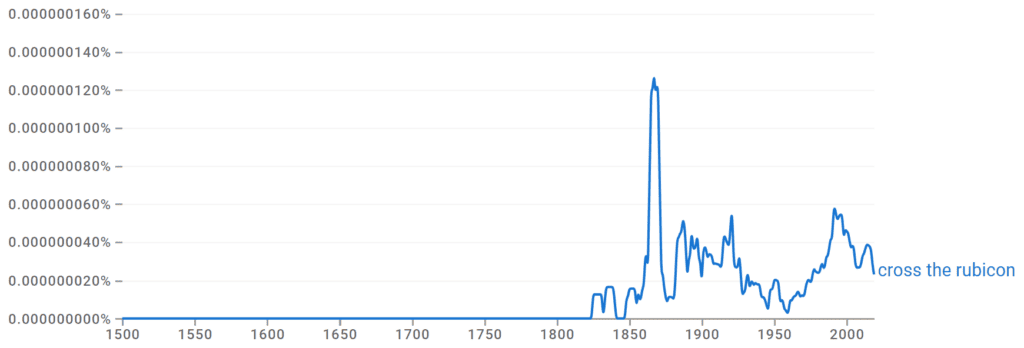In this quick guide, we’re crossing borders—and not just any borders. We’re crossing the Rubicon. It’s a phrase that’s been tossed around the English language for years.
But what does crossing the Rubicon even mean? How can you use it in a sentence? And why are we suddenly talking about ancient rivers? All will be revealed, my friend. Stick around as I explain the definition and origin of the phrase crossing the Rubicon.
What Does Crossing the Rubicon Mean?

Crossing the Rubicon means making an irrevocable decision that commits one to a specific course of action from which there is no turning back. It’s the point of no return, a decision that could have serious consequences.
It’s like when Aladdin entered the Cave of Wonders, and the tiger’s mouth slammed shut, diving below the sand. That was him crossing the Rubicon.
Origin and Etymology Behind Cross the Rubicon

The phrase originated from an event in 49 BC when Julius Caesar, a Roman general, made the famous decision and literally crossed the Rubicon River, an action that started a civil war in Rome. The shallow river was considered the point of no return, and crossing it was a declaration of war. Harsh, I know. At least now, we use it in a more casual way, as it became an idiom sometime in the 1800s.
Synonyms for Crossing the Rubicon
Here are just a few other ways you can express the same idea.
- Taking the plunge
- Passing the point of no return
- Making a final decision
- Taking a leap of faith
- Burning bridges
Crossing the Rubicon Examples in a Sentence

Context can help you understand a word or phrase much better. These full sentences should give you a better idea of how to use this expression.
- With that announcement, my mother has crossed the Rubicon, and there’s no going back on her decision.
- When he quit his job to start his own company, he knew he was crossing the Rubicon.
- Deciding to move abroad was like crossing the Rubicon for me.
- By revealing his secret, he crossed the Rubicon and couldn’t undo the consequences.
- Crossing the Rubicon, they decided to close the business despite the financial losses.
- She crossed the Rubicon by standing up to her boss.
- When the government enacted the controversial policy, it crossed the Rubicon and stirred public outrage.
- The musician crossed the Rubicon when he chose to change his genre.
- The software company crossed the Rubicon by deciding to switch to a subscription-based model.
Never Cross the Rubicon
So, the next time you find yourself at a pivotal moment, facing a decision that could drastically change the course of your life, remember, you might just be about to cross your own metaphorical Rubicon. And just like Julius Caesar, you too can make history—one decision at a time. Aren’t idioms fun? Have a look at others on our site and beef up your vocabulary.
